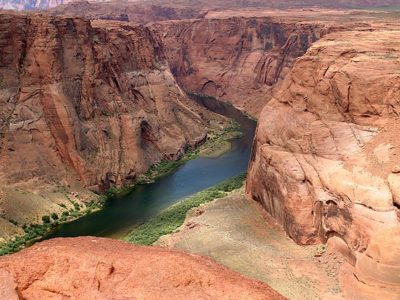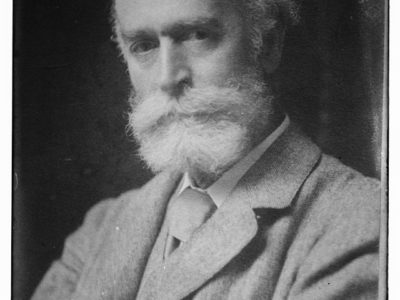Why Can’t We All Get Along On The Colorado River?
Maybe It Is Time For the Interior Secretary To Settle The Issue — And For Newspapers To Get Rid Of Op-Eds

Well, this was intriguing. An op-ed from ran with this evocative title:
California and its neighbors are at an impasse over the Colorado River. Here’s a way forward.
Its author was Eric Kuhn, a former general manager of the Colorado River Water Conservation District and a co-author of “Science Be Dammed: How Ignoring Inconvenient Science Drained the Colorado River.”
I should read this, I thought: given how completely intractable the River has been, maybe he knows something I don’t.
Kuhn’s solution: the states of the “lower basin” – California, Arizona, Nevada – should agree to an interstate compact.
Now, the obvious question is: how the hell are they supposed to do that? The three states can’t agree on anything regarding water. Back in the 1934. Arizona’s governor literally told boat owners to shoot at Metropolitan Water District engineers who were just measuring the Colorado for an aqueduct.
You might think that Kuhn – whose book is actually quite good – would tell us what should be in this compact. But no. Just that it should happen. Well, why in the world would they succeed now? Thus, the column’s kicker:
Given that Arizona and California couldn’t agree on water use before, why is such a deal possible now? The answer is that no better option exists. This is the only way for California and its neighbors to control their own water destiny.
Oy. Something would be the best solution, so it will happen? I feel like John McEnroe here.
In any event, potentially better option exists: let the Secretary of the Interior decide it. The Supreme Court’s 1963 decision in Arizona v California gave the Secretary the right to reduce different states’ allotments to river water based upon drought conditions. In 2003, Interior Secretary Gale Norton – not known as an environmentalist – found that the Imperial Irrigation District was wasting water and cut back on their allotment. Maybe that is a better way.
Or maybe not. But it is hardly obvious that three states who have proved for literally a century that they cannot agree on anything should agree on this.
—
I actually am less interested in picking on Kuhn here – like I said, his book is quite good – than on the Los Angeles Times, and really the op-ed editors of newspapers across the nation.
Why in the world did the Times run this piece? I think it’s because they wanted someone from Colorado to sound off on the issue. It didn’t matter what he or she said: just that there was someone from Colorado who could comment.
I am finding this more and more on op-ed pages. The point isn’t to say something new, or thoughtful, or constructive. The point is the person, not the content. Just the other day, the New York Times ran a piece by Michael Bloomberg entitled “Israel Is Courting Disaster.” He made what are by now familiar points – the coalition threatens democracy, it endangers the economy, it is alienating its best friends, etc. etc.
So then why run it? Because Michael Bloomberg was saying it. That’s it. It could have run as a title and a byline and had done with it.
A couple of years ago, Donald Trump talked about postponing the 2020 election. This is obviously unconstitutional, and the NYT ran an op-ed that it was unconstitutional by Steve Calabresi, the founder of the Federalist Society. Nothing was the least original in Calabresi’s piece, but it was Steve Calabresi.
Kuhn’s piece wasn’t exactly the same, because few know of him personally, but the LAT wanted someone from Colorado to argue that there should be a compact. The Times has been pushing this compact idea for a while, so it wanted someone else to say the same thing, even if there literally is no content in the idea.
It is very rare nowadays that I read an op-ed that tells me something new. Given my politics, I often like Paul Krugman, and I find him good because he actually talks about data. But that’s actually rare.

Perhaps it’s the medium: when was the last time that you really can find something new in 750 words? And with the growth of the web – not to mention substacks and blogs and social media – it isn’t clear to me that an op-ed page is even useful anymore. Newspapers should get rid of their columnists and hire more reporters. That would increase understanding a lot more than opinion pieces. As C P Scott, the founder of the Manchester Guardian, noted: Comment Is Free, But Facts Are Sacred. And you won’t find many facts on an op-ed page.
Reader Comments
One Reply to “Why Can’t We All Get Along On The Colorado River?”
Comments are closed.







I enjoyed reading this blog post. Just to get that out of the way.
Otherwise, total disagreement – even though I haven’t bothered with the LAT eds for ages. (Neoliberals! Who needs ’em? [winky face – there are maybe one or two I still listen to … ]) (My other peeve with the LAT op ed page is, I don’t think they do a good enough job identifying the speaker. Just tell me up front what their angle is. I might still read it.)
As unsatisfying as their op-ed pages are, at least they have them. Do you really think that there is robust intellectual debate happening, *anywhere* in California? Because if so, I’d *really* like to know where it is. I do not see it. And I’m *looking.* (Mind you, I do not use Twitter. Or Fb. Not that i’ve actually deteted. I just do not use them.)
I think maybe we need to start giving every household in the country a voucher to spend on a real newspaper. They *are* that important, and they *are* that threatened. (Of course, there’d need to be standards.) I am talking about the print kind. “Old Media.”
Then I can go back to safely ignoring 90% of the ed pages.
Also, no offense, but you may be vastly overestimating the average person’s knowledge base. It would probably be news to many people around here that we may be about to get a water haircut from the feds. (Personally I want a pipeline hooked up to the east end of the Colorado. Maybe. I don’t know. Thinking about it.)